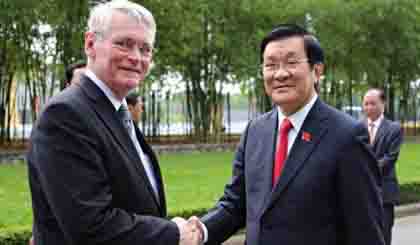Proud of sound relations with Vietnam: German Embassy's Charge d'Affaires
Hans-Jörg Brunner, Charge d'Affaires of the German Embassy in Vietnam, has expressed his pride in the sound co-operative relations between Vietnam and Germany throughout the 40 years of its establishment and development, affirming that bilateral ties are still cohesively growing and achieving an increasing number of successes despite the two countries’ geographical distance.
 |
| Charge d'Affaires of the German Embassy in Vietnam, Hans-Jörg Brunner (left) met with State President Truong Tan Sang on the occassion of the 70th anniversary of Vietnam's National Day. (Credit: German Embassy in Hanoi) |
Co-operation in the commercial sector remains one of the highlights of the Vietnam - Germany strategic partnership, with last year’s bilateral trade revenues reaching approximately US$7.8 billion. Vietnam’s economic open policy implemented over the past years has created favourable conditions for German investors to operate more vigorously and reap further successes, Brunner said. It can be said that the fine relations between the two countries are growing both extensively and intensively.
German companies are deeply impressed by Vietnam’s strong economic growth in recent years. Vietnam has become an attractive destination for German enterprises planning to expand operations in Asia, which is clearly manifested via their considerably increasing trend of investing in the country in recent years. In 2014 alone, Germany invested over US$160 million into Vietnam. The 14th Asia-Pacific Conference of German Business (APK) held in Ho Chi Minh (HCM) City last November, which attracted the participation of hundreds of enterprises from Germany and other regional countries, was evidence of the S-shaped country’s appeal to German companies as well as for the economic cohesion between the two countries, Brunner shared.
Furthermore, Germany is also promoting many infrastructure development projects in Vietnam, specifically in HCM City. According to Brunner, the German House in HCM City will be a venue for German agencies in Vietnam such as the German Consulate General, the Chamber of Commerce and Industry, the Goethe Institute and offices of German businesses. The metro line no. 2 project in HCM City is also scheduled to be implemented later this year, he added.
The signing of a free trade agreement (FTA) between Vietnam and the European Union promises to bring numerous opportunities for Vietnam - Germany business co-operation, Brunner said. He noted that over the past few years, Vietnam has actively improved the framework conditions for foreign investors and expanded its commercial relations. The German Charge d'Affaires said he hoped that Vietnam would continue its structural reforms in a move to create an open business environment for foreign investors.
In addition to the commercial sector, the 40-years of co-operation and development of Vietnam - Germany ties has recorded outstanding achievements in the fields of culture and education. As a meeting venue for lovers of German culture and language, the Goethe Institute and the German Academic Exchange Service have been operating successfully in Vietnam for decades, creating many significant milestones in enhancing cultural exchange between the two countries. These two institutions have opened up opportunities for thousands of students studying German in Hanoi and HCM City to access and become acquainted with German culture, while introducing many Vietnamese students to purse academic careers at university in Germany. Vietnamese students, after graduating from German universities, returned to the country and contributed their knowledge and intellect to national construction, Brunner emphasised.
Evidence of the effective educational co-operation between the two countries is seen in the establishment of the Vietnam-Germany University in 2008, developed based on Vietnam’s tertiary education system while meeting international standards. As revealed by Brunner, the Vietnam-Germany University trained roughly 1,000 students in ten majors over the 2014-2015 academic year. The university targets to train approximately 12,000 students by 2030. Brunner said that he was proud of the successful co-operative outcomes with Vietnamese partners, while expressing his happiness at the increasing popularity of the German language in Vietnam’s high schools. The German Charge d'Affaires said he believed that the increasing demand for learning German among Vietnamese youth will function as a driving force for education co-operation between the two countries.
(Source: nhandan.org.vn)
.
 về đầu trang
về đầu trang







